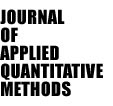 |
|
|||
An Empirical Investigations of Meta-Analysis using Randomized Controlled Clinical Trials in a Particular Centre
Chinnaiyan PONNURAJA
Perumal VENKATESAN
Keywords
fixed effects model, random effects model, heterogeneity of treatment effects
Abstract
Meta-analysis is the combination of results from various independent studies. In a meta-analysis, combining survival data from different clinical trials, an important issue is the possible heterogeneity between trials. Such inter-trial variation can not only be explained by heterogeneity of treatment effects across trials but also by heterogeneity of their baseline risk. In addition, one might examine the relationship between magnitude of the treatment effect and the underlying risk of the patients in the different trials. However, the need for medical research and clinical practice to be based on the totality of relevant and sound evidence has been increasingly recognized. In this paper, we review the advances of meta-analysis using clinical trials TB data. This paper examines sixteen reporting results of randomized clinical trials conducted in a particular centre at consecutive periods. Every study pools that the results from the relevant trials in order to evaluate the efficacy of a certain treatment between cases and control. There is a need for empirical effort comparing random effects model with the fixed effects model in the calculation of a pooled relative risk in the meta-analysis in systematic reviews of randomized controlled clinical trials. We review heterogeneity and random effects analyses and assessing bias within and across studies. We compare the two approaches with regards to statistical significance, summary relative risk, and confidence intervals.

